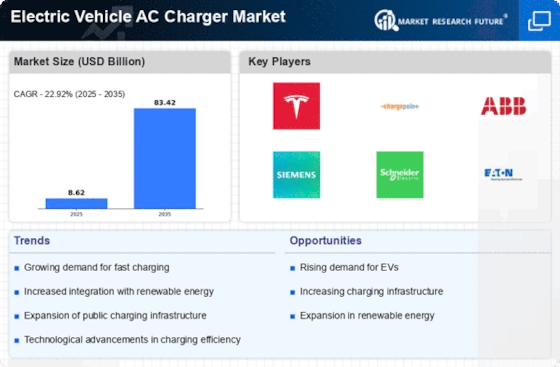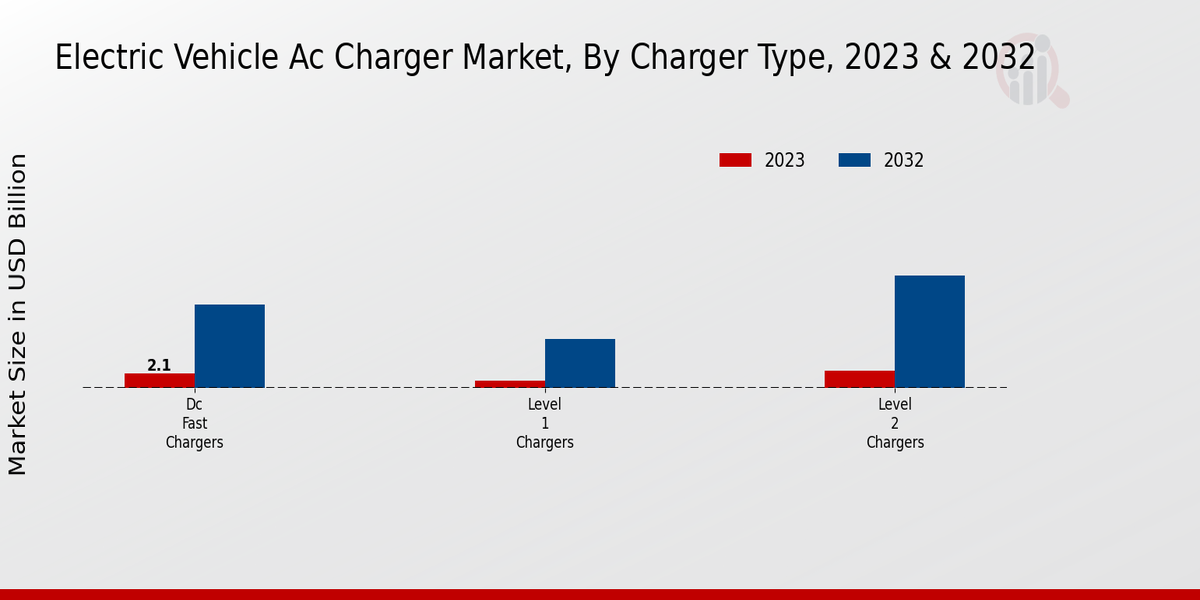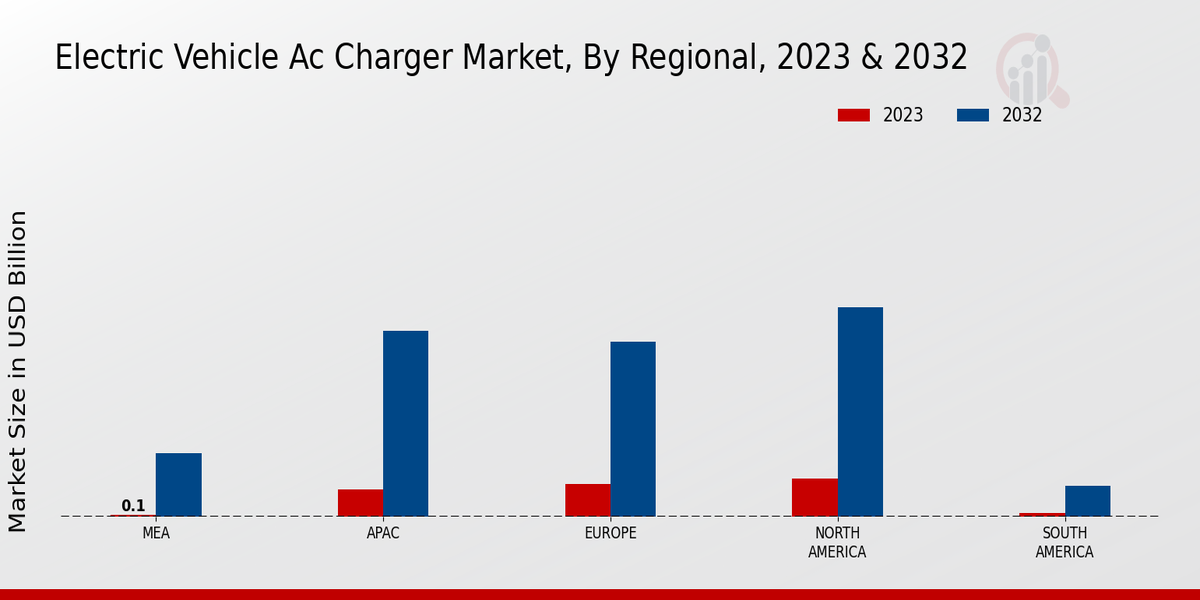-
'TABLE OF CONTENTS
-
EXECUTIVE SUMMARY
-
Market Overview
-
Key Findings
-
Market Segmentation
-
Competitive Landscape
-
Challenges and Opportunities
-
Future Outlook
-
MARKET INTRODUCTION
-
Definition
-
Scope of the study
- Research Objective
- Assumption
- Limitations
-
RESEARCH METHODOLOGY
-
Overview
-
Data Mining
-
Secondary Research
-
Primary Research
-
Primary Interviews and Information Gathering Process
-
Breakdown of Primary
-
Respondents
-
Forecasting Model
-
Market Size Estimation
-
Bottom-Up Approach
-
Top-Down Approach
-
Data Triangulation
-
Validation
-
MARKET DYNAMICS
-
Overview
-
Drivers
-
Restraints
-
Opportunities
-
MARKET FACTOR ANALYSIS
-
Value chain Analysis
-
Porter''s Five Forces
-
Analysis
-
Bargaining Power of Suppliers
- Bargaining Power
-
of Buyers
-
Threat of New Entrants
- Threat of Substitutes
- Intensity of Rivalry
-
COVID-19 Impact Analysis
-
Market Impact Analysis
-
Regional Impact
- Opportunity and
-
Threat Analysis
-
ELECTRIC VEHICLE AC CHARGER MARKET, BY
-
CHARGER TYPE (USD BILLION)
-
Level 1 Chargers
-
Level 2 Chargers
-
DC Fast Chargers
-
ELECTRIC VEHICLE AC CHARGER MARKET, BY CONNECTOR
-
TYPE (USD BILLION)
-
Type 1 (SAE J1772)
-
Type 2 (Mennekes)
-
CCS (Combined Charging System)
-
CHAdeMO
-
Tesla Connector
-
ELECTRIC VEHICLE AC CHARGER MARKET, BY CHARGING LOCATION (USD BILLION)
-
Residential
-
Commercial
-
Public Infrastructure
-
ELECTRIC VEHICLE AC CHARGER MARKET, BY INSTALLATION TYPE (USD BILLION)
-
Wall-mounted Chargers
-
Portable Chargers
-
Integrated
-
Charging Stations
-
ELECTRIC VEHICLE AC CHARGER MARKET, BY POWER OUTPUT
-
(USD BILLION)
-
Up to 3.7 kW
-
7 kW to 22 kW
-
Above
-
kW
-
ELECTRIC VEHICLE AC CHARGER MARKET, BY REGIONAL (USD BILLION)
-
North America
- US
- Canada
-
Europe
- Germany
- UK
- France
- Russia
- Italy
- Spain
- Rest of Europe
-
APAC
- China
- India
- Japan
- South
-
Korea
-
Malaysia
- Thailand
- Indonesia
- Rest of APAC
-
South America
- Brazil
-
Mexico
-
Argentina
- Rest of South America
-
MEA
- GCC Countries
- South Africa
- Rest of MEA
-
COMPETITIVE LANDSCAPE
-
Overview
-
Competitive Analysis
-
Market share Analysis
-
Major Growth
-
Strategy in the Electric Vehicle AC Charger Market
-
Competitive Benchmarking
-
Leading Players in Terms of Number of Developments in the Electric Vehicle
-
AC Charger Market
-
Key developments and growth strategies
-
New Product Launch/Service Deployment
-
Merger & Acquisitions
- Joint Ventures
-
Major Players Financial Matrix
-
Sales and Operating Income
-
Major Players R&D Expenditure. 2023
-
COMPANY PROFILES
-
GE
- Financial Overview
-
Products Offered
-
Key Developments
- SWOT Analysis
- Key Strategies
-
Bosch
- Financial Overview
- Products Offered
- Key Developments
- SWOT Analysis
- Key Strategies
-
Wallbox
- Financial Overview
- Products Offered
- Key Developments
- SWOT
-
Analysis
-
Key Strategies
-
ChargePoint
- Financial
-
Overview
-
Products Offered
- Key Developments
-
SWOT Analysis
-
Key Strategies
-
Eaton
- Financial
-
Overview
-
Products Offered
- Key Developments
-
SWOT Analysis
-
Key Strategies
-
Clipsal
- Financial
-
Overview
-
Products Offered
- Key Developments
-
SWOT Analysis
-
Key Strategies
-
Keystone Electric
-
Financial Overview
-
Products Offered
- Key Developments
- SWOT Analysis
- Key Strategies
-
Siemens
- Financial Overview
- Products Offered
- Key Developments
- SWOT Analysis
- Key Strategies
-
Blink Charging
- Financial Overview
- Products Offered
- Key
-
Developments
-
SWOT Analysis
- Key Strategies
-
ABB
-
Financial Overview
- Products Offered
-
Key Developments
-
SWOT Analysis
- Key Strategies
-
Level 2 Charging
- Financial Overview
- Products
-
Offered
-
Key Developments
- SWOT Analysis
-
Key Strategies
-
Siemens AG
- Financial Overview
-
Products Offered
-
Key Developments
- SWOT Analysis
- Key Strategies
-
Schneider Electric
- Financial
-
Overview
-
Products Offered
- Key Developments
-
SWOT Analysis
-
Key Strategies
-
Tesla
- Financial
-
Overview
-
Products Offered
- Key Developments
-
SWOT Analysis
-
Key Strategies
-
Duosida
-
Financial Overview
-
Products Offered
- Key Developments
- SWOT Analysis
- Key Strategies
-
APPENDIX
-
References
-
Related Reports
-
LIST OF ASSUMPTIONS
-
MARKET SIZE ESTIMATES & FORECAST, BY CHARGER TYPE, 2019-2032 (USD BILLIONS)
-
FORECAST, BY CONNECTOR TYPE, 2019-2032 (USD BILLIONS)
-
ELECTRIC VEHICLE AC CHARGER MARKET SIZE ESTIMATES & FORECAST, BY CHARGING LOCATION,
-
2032 (USD BILLIONS)
-
MARKET SIZE ESTIMATES & FORECAST, BY INSTALLATION TYPE, 2019-2032 (USD BILLIONS)
-
FORECAST, BY POWER OUTPUT, 2019-2032 (USD BILLIONS)
-
ELECTRIC VEHICLE AC CHARGER MARKET SIZE ESTIMATES & FORECAST, BY REGIONAL, 2019-2032
-
(USD BILLIONS)
-
& FORECAST, BY CHARGER TYPE, 2019-2032 (USD BILLIONS)
-
VEHICLE AC CHARGER MARKET SIZE ESTIMATES & FORECAST, BY CONNECTOR TYPE, 2019-2032
-
(USD BILLIONS)
-
& FORECAST, BY CHARGING LOCATION, 2019-2032 (USD BILLIONS)
-
ELECTRIC VEHICLE AC CHARGER MARKET SIZE ESTIMATES & FORECAST, BY INSTALLATION
-
TYPE, 2019-2032 (USD BILLIONS)
-
SIZE ESTIMATES & FORECAST, BY POWER OUTPUT, 2019-2032 (USD BILLIONS)
-
US ELECTRIC VEHICLE AC CHARGER MARKET SIZE ESTIMATES & FORECAST, BY REGIONAL,
-
2032 (USD BILLIONS)
-
SIZE ESTIMATES & FORECAST, BY CHARGER TYPE, 2019-2032 (USD BILLIONS)
-
CANADA ELECTRIC VEHICLE AC CHARGER MARKET SIZE ESTIMATES & FORECAST, BY
-
CONNECTOR TYPE, 2019-2032 (USD BILLIONS)
-
AC CHARGER MARKET SIZE ESTIMATES & FORECAST, BY CHARGING LOCATION, 2019-2032
-
(USD BILLIONS)
-
& FORECAST, BY INSTALLATION TYPE, 2019-2032 (USD BILLIONS)
-
ELECTRIC VEHICLE AC CHARGER MARKET SIZE ESTIMATES & FORECAST, BY POWER OUTPUT,
-
2032 (USD BILLIONS)
-
SIZE ESTIMATES & FORECAST, BY REGIONAL, 2019-2032 (USD BILLIONS)
-
EUROPE ELECTRIC VEHICLE AC CHARGER MARKET SIZE ESTIMATES & FORECAST, BY
-
CHARGER TYPE, 2019-2032 (USD BILLIONS)
-
CHARGER MARKET SIZE ESTIMATES & FORECAST, BY CONNECTOR TYPE, 2019-2032 (USD
-
BILLIONS)
-
& FORECAST, BY CHARGING LOCATION, 2019-2032 (USD BILLIONS)
-
ELECTRIC VEHICLE AC CHARGER MARKET SIZE ESTIMATES & FORECAST, BY INSTALLATION
-
TYPE, 2019-2032 (USD BILLIONS)
-
MARKET SIZE ESTIMATES & FORECAST, BY POWER OUTPUT, 2019-2032 (USD BILLIONS)
-
BY REGIONAL, 2019-2032 (USD BILLIONS)
-
CHARGER MARKET SIZE ESTIMATES & FORECAST, BY CHARGER TYPE, 2019-2032 (USD BILLIONS)
-
FORECAST, BY CONNECTOR TYPE, 2019-2032 (USD BILLIONS)
-
VEHICLE AC CHARGER MARKET SIZE ESTIMATES & FORECAST, BY CHARGING LOCATION, 2019-2032
-
(USD BILLIONS)
-
& FORECAST, BY INSTALLATION TYPE, 2019-2032 (USD BILLIONS)
-
ELECTRIC VEHICLE AC CHARGER MARKET SIZE ESTIMATES & FORECAST, BY POWER OUTPUT,
-
2032 (USD BILLIONS)
-
SIZE ESTIMATES & FORECAST, BY REGIONAL, 2019-2032 (USD BILLIONS)
-
UK ELECTRIC VEHICLE AC CHARGER MARKET SIZE ESTIMATES & FORECAST, BY CHARGER
-
TYPE, 2019-2032 (USD BILLIONS)
-
SIZE ESTIMATES & FORECAST, BY CONNECTOR TYPE, 2019-2032 (USD BILLIONS)
-
UK ELECTRIC VEHICLE AC CHARGER MARKET SIZE ESTIMATES & FORECAST, BY CHARGING
-
LOCATION, 2019-2032 (USD BILLIONS)
-
MARKET SIZE ESTIMATES & FORECAST, BY INSTALLATION TYPE, 2019-2032 (USD BILLIONS)
-
BY POWER OUTPUT, 2019-2032 (USD BILLIONS)
-
CHARGER MARKET SIZE ESTIMATES & FORECAST, BY REGIONAL, 2019-2032 (USD BILLIONS)
-
BY CHARGER TYPE, 2019-2032 (USD BILLIONS)
-
AC CHARGER MARKET SIZE ESTIMATES & FORECAST, BY CONNECTOR TYPE, 2019-2032 (USD
-
BILLIONS)
-
& FORECAST, BY CHARGING LOCATION, 2019-2032 (USD BILLIONS)
-
ELECTRIC VEHICLE AC CHARGER MARKET SIZE ESTIMATES & FORECAST, BY INSTALLATION
-
TYPE, 2019-2032 (USD BILLIONS)
-
MARKET SIZE ESTIMATES & FORECAST, BY POWER OUTPUT, 2019-2032 (USD BILLIONS)
-
BY REGIONAL, 2019-2032 (USD BILLIONS)
-
CHARGER MARKET SIZE ESTIMATES & FORECAST, BY CHARGER TYPE, 2019-2032 (USD BILLIONS)
-
BY CONNECTOR TYPE, 2019-2032 (USD BILLIONS)
-
AC CHARGER MARKET SIZE ESTIMATES & FORECAST, BY CHARGING LOCATION, 2019-2032
-
(USD BILLIONS)
-
& FORECAST, BY INSTALLATION TYPE, 2019-2032 (USD BILLIONS)
-
ELECTRIC VEHICLE AC CHARGER MARKET SIZE ESTIMATES & FORECAST, BY POWER OUTPUT,
-
2032 (USD BILLIONS)
-
SIZE ESTIMATES & FORECAST, BY REGIONAL, 2019-2032 (USD BILLIONS)
-
ITALY ELECTRIC VEHICLE AC CHARGER MARKET SIZE ESTIMATES & FORECAST, BY CHARGER
-
TYPE, 2019-2032 (USD BILLIONS)
-
MARKET SIZE ESTIMATES & FORECAST, BY CONNECTOR TYPE, 2019-2032 (USD BILLIONS)
-
BY CHARGING LOCATION, 2019-2032 (USD BILLIONS)
-
AC CHARGER MARKET SIZE ESTIMATES & FORECAST, BY INSTALLATION TYPE, 2019-2032
-
(USD BILLIONS)
-
& FORECAST, BY POWER OUTPUT, 2019-2032 (USD BILLIONS)
-
ELECTRIC VEHICLE AC CHARGER MARKET SIZE ESTIMATES & FORECAST, BY REGIONAL, 2019-2032
-
(USD BILLIONS)
-
& FORECAST, BY CHARGER TYPE, 2019-2032 (USD BILLIONS)
-
ELECTRIC VEHICLE AC CHARGER MARKET SIZE ESTIMATES & FORECAST, BY CONNECTOR TYPE,
-
2032 (USD BILLIONS)
-
SIZE ESTIMATES & FORECAST, BY CHARGING LOCATION, 2019-2032 (USD BILLIONS)
-
BY INSTALLATION TYPE, 2019-2032 (USD BILLIONS)
-
AC CHARGER MARKET SIZE ESTIMATES & FORECAST, BY POWER OUTPUT, 2019-2032 (USD
-
BILLIONS)
-
& FORECAST, BY REGIONAL, 2019-2032 (USD BILLIONS)
-
ELECTRIC VEHICLE AC CHARGER MARKET SIZE ESTIMATES & FORECAST, BY CHARGER TYPE,
-
2032 (USD BILLIONS)
-
MARKET SIZE ESTIMATES & FORECAST, BY CONNECTOR TYPE, 2019-2032 (USD BILLIONS)
-
& FORECAST, BY CHARGING LOCATION, 2019-2032 (USD BILLIONS)
-
OF EUROPE ELECTRIC VEHICLE AC CHARGER MARKET SIZE ESTIMATES & FORECAST, BY INSTALLATION
-
TYPE, 2019-2032 (USD BILLIONS)
-
CHARGER MARKET SIZE ESTIMATES & FORECAST, BY POWER OUTPUT, 2019-2032 (USD BILLIONS)
-
& FORECAST, BY REGIONAL, 2019-2032 (USD BILLIONS)
-
VEHICLE AC CHARGER MARKET SIZE ESTIMATES & FORECAST, BY CHARGER TYPE, 2019-2032
-
(USD BILLIONS)
-
& FORECAST, BY CONNECTOR TYPE, 2019-2032 (USD BILLIONS)
-
ELECTRIC VEHICLE AC CHARGER MARKET SIZE ESTIMATES & FORECAST, BY CHARGING LOCATION,
-
2032 (USD BILLIONS)
-
SIZE ESTIMATES & FORECAST, BY INSTALLATION TYPE, 2019-2032 (USD BILLIONS)
-
BY POWER OUTPUT, 2019-2032 (USD BILLIONS)
-
AC CHARGER MARKET SIZE ESTIMATES & FORECAST, BY REGIONAL, 2019-2032 (USD BILLIONS)
-
BY CHARGER TYPE, 2019-2032 (USD BILLIONS)
-
AC CHARGER MARKET SIZE ESTIMATES & FORECAST, BY CONNECTOR TYPE, 2019-2032 (USD
-
BILLIONS)
-
& FORECAST, BY CHARGING LOCATION, 2019-2032 (USD BILLIONS)
-
ELECTRIC VEHICLE AC CHARGER MARKET SIZE ESTIMATES & FORECAST, BY INSTALLATION
-
TYPE, 2019-2032 (USD BILLIONS)
-
MARKET SIZE ESTIMATES & FORECAST, BY POWER OUTPUT, 2019-2032 (USD BILLIONS)
-
BY REGIONAL, 2019-2032 (USD BILLIONS)
-
CHARGER MARKET SIZE ESTIMATES & FORECAST, BY CHARGER TYPE, 2019-2032 (USD BILLIONS)
-
BY CONNECTOR TYPE, 2019-2032 (USD BILLIONS)
-
AC CHARGER MARKET SIZE ESTIMATES & FORECAST, BY CHARGING LOCATION, 2019-2032
-
(USD BILLIONS)
-
& FORECAST, BY INSTALLATION TYPE, 2019-2032 (USD BILLIONS)
-
ELECTRIC VEHICLE AC CHARGER MARKET SIZE ESTIMATES & FORECAST, BY POWER OUTPUT,
-
2032 (USD BILLIONS)
-
SIZE ESTIMATES & FORECAST, BY REGIONAL, 2019-2032 (USD BILLIONS)
-
JAPAN ELECTRIC VEHICLE AC CHARGER MARKET SIZE ESTIMATES & FORECAST, BY CHARGER
-
TYPE, 2019-2032 (USD BILLIONS)
-
MARKET SIZE ESTIMATES & FORECAST, BY CONNECTOR TYPE, 2019-2032 (USD BILLIONS)
-
BY CHARGING LOCATION, 2019-2032 (USD BILLIONS)
-
AC CHARGER MARKET SIZE ESTIMATES & FORECAST, BY INSTALLATION TYPE, 2019-2032
-
(USD BILLIONS)
-
& FORECAST, BY POWER OUTPUT, 2019-2032 (USD BILLIONS)
-
ELECTRIC VEHICLE AC CHARGER MARKET SIZE ESTIMATES & FORECAST, BY REGIONAL, 2019-2032
-
(USD BILLIONS)
-
ESTIMATES & FORECAST, BY CHARGER TYPE, 2019-2032 (USD BILLIONS)
-
SOUTH KOREA ELECTRIC VEHICLE AC CHARGER MARKET SIZE ESTIMATES & FORECAST,
-
BY CONNECTOR TYPE, 2019-2032 (USD BILLIONS)
-
VEHICLE AC CHARGER MARKET SIZE ESTIMATES & FORECAST, BY CHARGING LOCATION, 2019-2032
-
(USD BILLIONS)
-
ESTIMATES & FORECAST, BY INSTALLATION TYPE, 2019-2032 (USD BILLIONS)
-
SOUTH KOREA ELECTRIC VEHICLE AC CHARGER MARKET SIZE ESTIMATES & FORECAST,
-
BY POWER OUTPUT, 2019-2032 (USD BILLIONS)
-
AC CHARGER MARKET SIZE ESTIMATES & FORECAST, BY REGIONAL, 2019-2032 (USD BILLIONS)
-
FORECAST, BY CHARGER TYPE, 2019-2032 (USD BILLIONS)
-
VEHICLE AC CHARGER MARKET SIZE ESTIMATES & FORECAST, BY CONNECTOR TYPE, 2019-2032
-
(USD BILLIONS)
-
ESTIMATES & FORECAST, BY CHARGING LOCATION, 2019-2032 (USD BILLIONS)
-
MALAYSIA ELECTRIC VEHICLE AC CHARGER MARKET SIZE ESTIMATES & FORECAST,
-
BY INSTALLATION TYPE, 2019-2032 (USD BILLIONS)
-
VEHICLE AC CHARGER MARKET SIZE ESTIMATES & FORECAST, BY POWER OUTPUT, 2019-2032
-
(USD BILLIONS)
-
ESTIMATES & FORECAST, BY REGIONAL, 2019-2032 (USD BILLIONS)
-
THAILAND ELECTRIC VEHICLE AC CHARGER MARKET SIZE ESTIMATES & FORECAST, BY CHARGER
-
TYPE, 2019-2032 (USD BILLIONS)
-
MARKET SIZE ESTIMATES & FORECAST, BY CONNECTOR TYPE, 2019-2032 (USD BILLIONS)
-
FORECAST, BY CHARGING LOCATION, 2019-2032 (USD BILLIONS)
-
ELECTRIC VEHICLE AC CHARGER MARKET SIZE ESTIMATES & FORECAST, BY INSTALLATION
-
TYPE, 2019-2032 (USD BILLIONS)
-
MARKET SIZE ESTIMATES & FORECAST, BY POWER OUTPUT, 2019-2032 (USD BILLIONS)
-
FORECAST, BY REGIONAL, 2019-2032 (USD BILLIONS)
-
VEHICLE AC CHARGER MARKET SIZE ESTIMATES & FORECAST, BY CHARGER TYPE, 2019-2032
-
(USD BILLIONS)
-
ESTIMATES & FORECAST, BY CONNECTOR TYPE, 2019-2032 (USD BILLIONS)
-
INDONESIA ELECTRIC VEHICLE AC CHARGER MARKET SIZE ESTIMATES & FORECAST,
-
BY CHARGING LOCATION, 2019-2032 (USD BILLIONS)
-
VEHICLE AC CHARGER MARKET SIZE ESTIMATES & FORECAST, BY INSTALLATION TYPE, 2019-2032
-
(USD BILLIONS)
-
ESTIMATES & FORECAST, BY POWER OUTPUT, 2019-2032 (USD BILLIONS)
-
INDONESIA ELECTRIC VEHICLE AC CHARGER MARKET SIZE ESTIMATES & FORECAST,
-
BY REGIONAL, 2019-2032 (USD BILLIONS)
-
AC CHARGER MARKET SIZE ESTIMATES & FORECAST, BY CHARGER TYPE, 2019-2032 (USD
-
BILLIONS)
-
ESTIMATES & FORECAST, BY CONNECTOR TYPE, 2019-2032 (USD BILLIONS)
-
REST OF APAC ELECTRIC VEHICLE AC CHARGER MARKET SIZE ESTIMATES & FORECAST,
-
BY CHARGING LOCATION, 2019-2032 (USD BILLIONS)
-
VEHICLE AC CHARGER MARKET SIZE ESTIMATES & FORECAST, BY INSTALLATION TYPE, 2019-2032
-
(USD BILLIONS)
-
SIZE ESTIMATES & FORECAST, BY POWER OUTPUT, 2019-2032 (USD BILLIONS)
-
REST OF APAC ELECTRIC VEHICLE AC CHARGER MARKET SIZE ESTIMATES & FORECAST,
-
BY REGIONAL, 2019-2032 (USD BILLIONS)
-
AC CHARGER MARKET SIZE ESTIMATES & FORECAST, BY CHARGER TYPE, 2019-2032 (USD
-
BILLIONS)
-
ESTIMATES & FORECAST, BY CONNECTOR TYPE, 2019-2032 (USD BILLIONS)
-
SOUTH AMERICA ELECTRIC VEHICLE AC CHARGER MARKET SIZE ESTIMATES & FORECAST,
-
BY CHARGING LOCATION, 2019-2032 (USD BILLIONS)
-
VEHICLE AC CHARGER MARKET SIZE ESTIMATES & FORECAST, BY INSTALLATION TYPE, 2019-2032
-
(USD BILLIONS)
-
SIZE ESTIMATES & FORECAST, BY POWER OUTPUT, 2019-2032 (USD BILLIONS)
-
SOUTH AMERICA ELECTRIC VEHICLE AC CHARGER MARKET SIZE ESTIMATES & FORECAST,
-
BY REGIONAL, 2019-2032 (USD BILLIONS)
-
CHARGER MARKET SIZE ESTIMATES & FORECAST, BY CHARGER TYPE, 2019-2032 (USD BILLIONS)
-
FORECAST, BY CONNECTOR TYPE, 2019-2032 (USD BILLIONS)
-
VEHICLE AC CHARGER MARKET SIZE ESTIMATES & FORECAST, BY CHARGING LOCATION, 2019-2032
-
(USD BILLIONS)
-
& FORECAST, BY INSTALLATION TYPE, 2019-2032 (USD BILLIONS)
-
BRAZIL ELECTRIC VEHICLE AC CHARGER MARKET SIZE ESTIMATES & FORECAST, BY POWER
-
OUTPUT, 2019-2032 (USD BILLIONS)
-
MARKET SIZE ESTIMATES & FORECAST, BY REGIONAL, 2019-2032 (USD BILLIONS)
-
BY CHARGER TYPE, 2019-2032 (USD BILLIONS)
-
AC CHARGER MARKET SIZE ESTIMATES & FORECAST, BY CONNECTOR TYPE, 2019-2032 (USD
-
BILLIONS)
-
& FORECAST, BY CHARGING LOCATION, 2019-2032 (USD BILLIONS)
-
MEXICO ELECTRIC VEHICLE AC CHARGER MARKET SIZE ESTIMATES & FORECAST, BY INSTALLATION
-
TYPE, 2019-2032 (USD BILLIONS)
-
MARKET SIZE ESTIMATES & FORECAST, BY POWER OUTPUT, 2019-2032 (USD BILLIONS)
-
FORECAST, BY REGIONAL, 2019-2032 (USD BILLIONS)
-
VEHICLE AC CHARGER MARKET SIZE ESTIMATES & FORECAST, BY CHARGER TYPE, 2019-2032
-
(USD BILLIONS)
-
ESTIMATES & FORECAST, BY CONNECTOR TYPE, 2019-2032 (USD BILLIONS)
-
ARGENTINA ELECTRIC VEHICLE AC CHARGER MARKET SIZE ESTIMATES & FORECAST,
-
BY CHARGING LOCATION, 2019-2032 (USD BILLIONS)
-
VEHICLE AC CHARGER MARKET SIZE ESTIMATES & FORECAST, BY INSTALLATION TYPE, 2019-2032
-
(USD BILLIONS)
-
ESTIMATES & FORECAST, BY POWER OUTPUT, 2019-2032 (USD BILLIONS)
-
ARGENTINA ELECTRIC VEHICLE AC CHARGER MARKET SIZE ESTIMATES & FORECAST,
-
BY REGIONAL, 2019-2032 (USD BILLIONS)
-
VEHICLE AC CHARGER MARKET SIZE ESTIMATES & FORECAST, BY CHARGER TYPE, 2019-2032
-
(USD BILLIONS)
-
MARKET SIZE ESTIMATES & FORECAST, BY CONNECTOR TYPE, 2019-2032 (USD BILLIONS)
-
& FORECAST, BY CHARGING LOCATION, 2019-2032 (USD BILLIONS)
-
REST OF SOUTH AMERICA ELECTRIC VEHICLE AC CHARGER MARKET SIZE ESTIMATES & FORECAST,
-
BY INSTALLATION TYPE, 2019-2032 (USD BILLIONS)
-
ELECTRIC VEHICLE AC CHARGER MARKET SIZE ESTIMATES & FORECAST, BY POWER OUTPUT,
-
2032 (USD BILLIONS)
-
AC CHARGER MARKET SIZE ESTIMATES & FORECAST, BY REGIONAL, 2019-2032 (USD BILLIONS)
-
BY CHARGER TYPE, 2019-2032 (USD BILLIONS)
-
AC CHARGER MARKET SIZE ESTIMATES & FORECAST, BY CONNECTOR TYPE, 2019-2032 (USD
-
BILLIONS)
-
& FORECAST, BY CHARGING LOCATION, 2019-2032 (USD BILLIONS)
-
MEA ELECTRIC VEHICLE AC CHARGER MARKET SIZE ESTIMATES & FORECAST, BY INSTALLATION
-
TYPE, 2019-2032 (USD BILLIONS)
-
MARKET SIZE ESTIMATES & FORECAST, BY POWER OUTPUT, 2019-2032 (USD BILLIONS)
-
BY REGIONAL, 2019-2032 (USD BILLIONS)
-
AC CHARGER MARKET SIZE ESTIMATES & FORECAST, BY CHARGER TYPE, 2019-2032 (USD
-
BILLIONS)
-
ESTIMATES & FORECAST, BY CONNECTOR TYPE, 2019-2032 (USD BILLIONS)
-
GCC COUNTRIES ELECTRIC VEHICLE AC CHARGER MARKET SIZE ESTIMATES & FORECAST,
-
BY CHARGING LOCATION, 2019-2032 (USD BILLIONS)
-
VEHICLE AC CHARGER MARKET SIZE ESTIMATES & FORECAST, BY INSTALLATION TYPE, 2019-2032
-
(USD BILLIONS)
-
SIZE ESTIMATES & FORECAST, BY POWER OUTPUT, 2019-2032 (USD BILLIONS)
-
GCC COUNTRIES ELECTRIC VEHICLE AC CHARGER MARKET SIZE ESTIMATES & FORECAST,
-
BY REGIONAL, 2019-2032 (USD BILLIONS)
-
AC CHARGER MARKET SIZE ESTIMATES & FORECAST, BY CHARGER TYPE, 2019-2032 (USD
-
BILLIONS)
-
ESTIMATES & FORECAST, BY CONNECTOR TYPE, 2019-2032 (USD BILLIONS)
-
SOUTH AFRICA ELECTRIC VEHICLE AC CHARGER MARKET SIZE ESTIMATES & FORECAST,
-
BY CHARGING LOCATION, 2019-2032 (USD BILLIONS)
-
VEHICLE AC CHARGER MARKET SIZE ESTIMATES & FORECAST, BY INSTALLATION TYPE, 2019-2032
-
(USD BILLIONS)
-
SIZE ESTIMATES & FORECAST, BY POWER OUTPUT, 2019-2032 (USD BILLIONS)
-
SOUTH AFRICA ELECTRIC VEHICLE AC CHARGER MARKET SIZE ESTIMATES & FORECAST,
-
BY REGIONAL, 2019-2032 (USD BILLIONS)
-
AC CHARGER MARKET SIZE ESTIMATES & FORECAST, BY CHARGER TYPE, 2019-2032 (USD
-
BILLIONS)
-
& FORECAST, BY CONNECTOR TYPE, 2019-2032 (USD BILLIONS)
-
OF MEA ELECTRIC VEHICLE AC CHARGER MARKET SIZE ESTIMATES & FORECAST, BY CHARGING
-
LOCATION, 2019-2032 (USD BILLIONS)
-
AC CHARGER MARKET SIZE ESTIMATES & FORECAST, BY INSTALLATION TYPE, 2019-2032
-
(USD BILLIONS)
-
ESTIMATES & FORECAST, BY POWER OUTPUT, 2019-2032 (USD BILLIONS)
-
REST OF MEA ELECTRIC VEHICLE AC CHARGER MARKET SIZE ESTIMATES & FORECAST,
-
BY REGIONAL, 2019-2032 (USD BILLIONS)
-
MARKET ANALYSIS
-
CHARGER TYPE
-
TYPE
-
LOCATION
-
TYPE
-
CANADA ELECTRIC VEHICLE AC CHARGER MARKET ANALYSIS BY CHARGER TYPE
-
CANADA ELECTRIC VEHICLE AC CHARGER MARKET ANALYSIS BY CONNECTOR TYPE
-
CANADA ELECTRIC VEHICLE AC CHARGER MARKET ANALYSIS BY CHARGING LOCATION
-
TYPE
-
OUTPUT
-
GERMANY ELECTRIC VEHICLE AC CHARGER MARKET ANALYSIS BY CHARGER TYPE
-
GERMANY ELECTRIC VEHICLE AC CHARGER MARKET ANALYSIS BY CONNECTOR TYPE
-
GERMANY ELECTRIC VEHICLE AC CHARGER MARKET ANALYSIS BY CHARGING LOCATION
-
TYPE
-
OUTPUT
-
TYPE
-
TYPE
-
LOCATION
-
INSTALLATION TYPE
-
BY POWER OUTPUT
-
BY REGIONAL
-
BY CHARGER TYPE
-
BY CONNECTOR TYPE
-
BY CHARGING LOCATION
-
ANALYSIS BY INSTALLATION TYPE
-
MARKET ANALYSIS BY POWER OUTPUT
-
MARKET ANALYSIS BY REGIONAL
-
ANALYSIS BY CHARGER TYPE
-
ANALYSIS BY CONNECTOR TYPE
-
ANALYSIS BY CHARGING LOCATION
-
MARKET ANALYSIS BY INSTALLATION TYPE
-
CHARGER MARKET ANALYSIS BY POWER OUTPUT
-
AC CHARGER MARKET ANALYSIS BY REGIONAL
-
CHARGER MARKET ANALYSIS BY CHARGER TYPE
-
AC CHARGER MARKET ANALYSIS BY CONNECTOR TYPE
-
AC CHARGER MARKET ANALYSIS BY CHARGING LOCATION
-
VEHICLE AC CHARGER MARKET ANALYSIS BY INSTALLATION TYPE
-
VEHICLE AC CHARGER MARKET ANALYSIS BY POWER OUTPUT
-
VEHICLE AC CHARGER MARKET ANALYSIS BY REGIONAL
-
VEHICLE AC CHARGER MARKET ANALYSIS BY CHARGER TYPE
-
ELECTRIC VEHICLE AC CHARGER MARKET ANALYSIS BY CONNECTOR TYPE
-
OF EUROPE ELECTRIC VEHICLE AC CHARGER MARKET ANALYSIS BY CHARGING LOCATION
-
REST OF EUROPE ELECTRIC VEHICLE AC CHARGER MARKET ANALYSIS BY INSTALLATION TYPE
-
OUTPUT
-
BY REGIONAL
-
TYPE
-
OUTPUT
-
TYPE
-
LOCATION
-
TYPE
-
OUTPUT
-
TYPE
-
LOCATION
-
TYPE
-
OUTPUT
-
TYPE
-
CONNECTOR TYPE
-
BY CHARGING LOCATION
-
ANALYSIS BY INSTALLATION TYPE
-
MARKET ANALYSIS BY POWER OUTPUT
-
CHARGER MARKET ANALYSIS BY REGIONAL
-
CHARGER MARKET ANALYSIS BY CHARGER TYPE
-
AC CHARGER MARKET ANALYSIS BY CONNECTOR TYPE
-
VEHICLE AC CHARGER MARKET ANALYSIS BY CHARGING LOCATION
-
ELECTRIC VEHICLE AC CHARGER MARKET ANALYSIS BY INSTALLATION TYPE
-
MALAYSIA ELECTRIC VEHICLE AC CHARGER MARKET ANALYSIS BY POWER OUTPUT
-
MALAYSIA ELECTRIC VEHICLE AC CHARGER MARKET ANALYSIS BY REGIONAL
-
THAILAND ELECTRIC VEHICLE AC CHARGER MARKET ANALYSIS BY CHARGER TYPE
-
THAILAND ELECTRIC VEHICLE AC CHARGER MARKET ANALYSIS BY CONNECTOR TYPE
-
THAILAND ELECTRIC VEHICLE AC CHARGER MARKET ANALYSIS BY CHARGING LOCATION
-
TYPE
-
OUTPUT
-
REGIONAL
-
BY CHARGER TYPE
-
BY CONNECTOR TYPE
-
ANALYSIS BY CHARGING LOCATION
-
MARKET ANALYSIS BY INSTALLATION TYPE
-
AC CHARGER MARKET ANALYSIS BY POWER OUTPUT
-
VEHICLE AC CHARGER MARKET ANALYSIS BY REGIONAL
-
VEHICLE AC CHARGER MARKET ANALYSIS BY CHARGER TYPE
-
ELECTRIC VEHICLE AC CHARGER MARKET ANALYSIS BY CONNECTOR TYPE
-
REST OF APAC ELECTRIC VEHICLE AC CHARGER MARKET ANALYSIS BY CHARGING LOCATION
-
TYPE
-
BY POWER OUTPUT
-
ANALYSIS BY REGIONAL
-
MARKET ANALYSIS
-
BY CHARGER TYPE
-
BY CONNECTOR TYPE
-
BY CHARGING LOCATION
-
ANALYSIS BY INSTALLATION TYPE
-
MARKET ANALYSIS BY POWER OUTPUT
-
MARKET ANALYSIS BY REGIONAL
-
MARKET ANALYSIS BY CHARGER TYPE
-
MARKET ANALYSIS BY CONNECTOR TYPE
-
MARKET ANALYSIS BY CHARGING LOCATION
-
CHARGER MARKET ANALYSIS BY INSTALLATION TYPE
-
AC CHARGER MARKET ANALYSIS BY POWER OUTPUT
-
AC CHARGER MARKET ANALYSIS BY REGIONAL
-
AC CHARGER MARKET ANALYSIS BY CHARGER TYPE
-
VEHICLE AC CHARGER MARKET ANALYSIS BY CONNECTOR TYPE
-
ELECTRIC VEHICLE AC CHARGER MARKET ANALYSIS BY CHARGING LOCATION
-
ARGENTINA ELECTRIC VEHICLE AC CHARGER MARKET ANALYSIS BY INSTALLATION TYPE
-
ARGENTINA ELECTRIC VEHICLE AC CHARGER MARKET ANALYSIS BY POWER OUTPUT
-
ARGENTINA ELECTRIC VEHICLE AC CHARGER MARKET ANALYSIS BY REGIONAL
-
REST OF SOUTH AMERICA ELECTRIC VEHICLE AC CHARGER MARKET ANALYSIS BY CHARGER
-
TYPE
-
ANALYSIS BY CONNECTOR TYPE
-
AC CHARGER MARKET ANALYSIS BY CHARGING LOCATION
-
AMERICA ELECTRIC VEHICLE AC CHARGER MARKET ANALYSIS BY INSTALLATION TYPE
-
REST OF SOUTH AMERICA ELECTRIC VEHICLE AC CHARGER MARKET ANALYSIS BY POWER
-
OUTPUT
-
ANALYSIS BY REGIONAL
-
TYPE
-
BY CONNECTOR TYPE
-
ANALYSIS BY CHARGING LOCATION
-
CHARGER MARKET ANALYSIS BY INSTALLATION TYPE
-
VEHICLE AC CHARGER MARKET ANALYSIS BY POWER OUTPUT
-
ELECTRIC VEHICLE AC CHARGER MARKET ANALYSIS BY REGIONAL
-
AFRICA ELECTRIC VEHICLE AC CHARGER MARKET ANALYSIS BY CHARGER TYPE
-
SOUTH AFRICA ELECTRIC VEHICLE AC CHARGER MARKET ANALYSIS BY CONNECTOR TYPE
-
LOCATION
-
BY INSTALLATION TYPE
-
MARKET ANALYSIS BY POWER OUTPUT
-
AC CHARGER MARKET ANALYSIS BY REGIONAL
-
AC CHARGER MARKET ANALYSIS BY CHARGER TYPE
-
VEHICLE AC CHARGER MARKET ANALYSIS BY CONNECTOR TYPE
-
ELECTRIC VEHICLE AC CHARGER MARKET ANALYSIS BY CHARGING LOCATION
-
REST OF MEA ELECTRIC VEHICLE AC CHARGER MARKET ANALYSIS BY INSTALLATION TYPE
-
VEHICLE AC CHARGER MARKET
-
AC CHARGER MARKET
-
AC CHARGER MARKET
-
MARKET
-
(% SHARE)
-
TO 2032 (USD Billions)
-
BY CONNECTOR TYPE, 2024 (% SHARE)
-
MARKET, BY CONNECTOR TYPE, 2019 TO 2032 (USD Billions)
-
VEHICLE AC CHARGER MARKET, BY CHARGING LOCATION, 2024 (% SHARE)
-
ELECTRIC VEHICLE AC CHARGER MARKET, BY CHARGING LOCATION, 2019 TO 2032 (USD Billions)
-
(% SHARE)
-
TYPE, 2019 TO 2032 (USD Billions)
-
MARKET, BY POWER OUTPUT, 2024 (% SHARE)
-
MARKET, BY POWER OUTPUT, 2019 TO 2032 (USD Billions)
-
VEHICLE AC CHARGER MARKET, BY REGIONAL, 2024 (% SHARE)
-
VEHICLE AC CHARGER MARKET, BY REGIONAL, 2019 TO 2032 (USD Billions)
-
BENCHMARKING OF MAJOR COMPETITORS'













